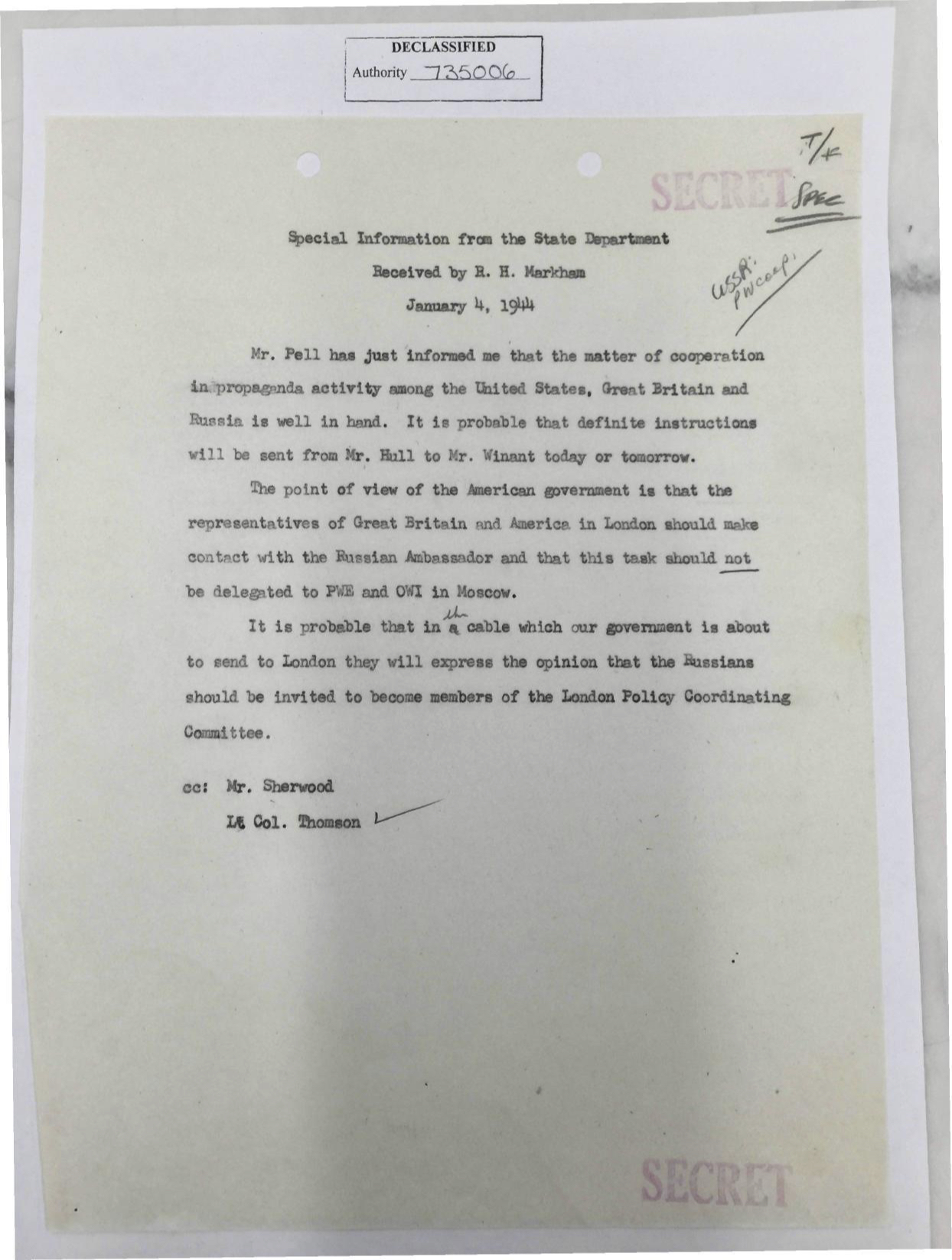 The World War II propaganda arm of the United States government, the Office of War Information (OWI), was the parent agency of the Voice of America (VOA). VOA was celebrating its 75th anniversary in February 2017.
The World War II propaganda arm of the United States government, the Office of War Information (OWI), was the parent agency of the Voice of America (VOA). VOA was celebrating its 75th anniversary in February 2017.
In this new historical series about the Voice of America, Cold War Radio Museum presents formerly classified U.S. government documents relating to the origins and the first years of America’s “Voice” to the world. This never before published information may be especially relevant in light of charges of alleged Russian propaganda attempts to influence the outcome of the 2016 U.S. presidential election and the establishment by the U.S. Congress of the the Global Engagement Center. This bipartisan initiative of U.S. Senators Rob Portman (R-OH) and Chris Murphy (D-CT) was designed to help American allies counter foreign government propaganda and disinformation from Russia, China, and other nations. It was signed into law by President Obama as part of the FY 2017 National Defense Authorization Act (NDAA) Conference Report.
75th Anniversary of Voice of America – Propaganda Coordination with USSR
By Ted Lipien
VOA’s true origins and history are quite different from the official sugared version repeated by the organization’s leaders and public relations specialists over many decades. While VOA rehabilitated itself to a large degree during the later years of the Cold War with mostly honest news reporting and only sporadic censorship, VOA’s origins were deeply steeped in misleading propaganda, some of which was foreign propaganda, in this particular case, of Soviet origin.
During World War II, VOA’s leaders and journalists, many of them ideologically driven, had put out what they knew were fake Soviet propaganda news. They also attacked or ignored smaller U.S. war allies who had run afoul of Stalin’s political aims and ambitions by resisting his attempts to turn them into Soviet satellites. To a large degree, the early VOA was run not by the White House or the State Department, but by a small group of managers and activists who created their own propaganda mixed with Soviet propaganda and disinformation.
Among OWI’s many activities designed to sway public opinion, both foreign and domestic, were propaganda films produced to defend and justify the illegal internment of U.S. citizens of Japanese ancestry. In violations of U.S. laws, the OWI also tried to censor political reporting by domestic U.S. media critical of the Soviet Union while at the same time feeding American journalists and broadcasters its own censored and misleading news.
What the OWI and the early VOA did not do, however, was to engage in blatant partisan reporting of the kind seen in recent years. As biased and politicized as VOA was during World War II, such crude partisanship was generally avoided or VOA would have surely seen itself defunded by the suspicious Congress.
Very few people today know that during World War II the Voice of America had coordinated closely content of its news and commentary with Soviet propaganda. The chief initiator of this effort was VOA’s “Founding Father,” Robert E. Sherwood, one of OWI’s and VOA’s two top executives. Most of VOA’s higher-level wartime managers were admirers of Stalin and Soviet socialism.
A well-known American playwright, Robert E. Sherwood also served as President Franklin Delano Roosevelt’s trusted speech writer. After a falling out with OWI’s director, Elmer Davis, who himself produced pro-Soviet propaganda commentaries for VOA and domestic U.S. media, Sherwood was sent to London where he put himself in charge of coordinating propaganda with the British and with the representatives of the Soviet Embassy. Davis, Sherwood, as well as VOA’s first director John Houseman, were political appointees who were neither vetted nor confirmed by the U.S. Senate, a practice adopted in later years after VOA was moved to the State Department in 1945 and later to the United States Information Agency (USIA) in 1953.
Throughout World War II, the OWI and the VOA covered up all of Stalin’s crimes, including the horrific 1940 Katyn Forest massacre of thousands of Polish military POW officers. VOA eagerly repeated Soviet lies about various other communist atrocities. From time to time, VOA also put out without any challenge Soviet news designed to justify the installation of Soviet-controlled communist-dominated governments in Eastern Europe. The OWI even managed to silence a few American radio stations, which were critical of Stalin, by threatening them with FCC sanctions in violation of the U.S. law. These abuses by the OWI and the VOA were so egregious that even during the war members of Congress of both parties had tried to defund the OWI and the Voice of America and almost succeeded in their efforts. Some of the OWI’s funding was reduced as a result of Congressional displeasure.
It is a common misconception that throughout VOA’s history directives from the White House and the State Department were responsible for most of VOA’s propaganda, censorship and news reporting failures. In fact, then as well as today, VOA’s executives and reporters generated much of the propaganda on their own. During World War II, some of VOA’s leaders and programmers were far more pro-USSR and pro-Stalin than the Roosevelt administration wanted them to be. By using the Soviet propaganda line and attacking potential U.S. collaborators in the French Vichy government and the Italian government, VOA was blamed by the Pentagon and the State Department for undermining U.S. war and diplomatic aims in North Africa and Italy. This infuriated, among others, General Dwight Eisenhower and resulted in at least one public rebuke of the Voice of America from President Roosevelt himself.
Dozens of communists and Soviet sympathizers, including a few actual Soviet agents, were working at the OWI and the VOA during the war. Their influence over Voice of America’s broadcasts was so powerful that even Left-leaning American labor unions ceased their cooperation with VOA in producing programs about American labor issues. Some Communist Party members at the Voice of America were fired during the war, but others remained for a few more years. At least two of them later joined communist regimes in Eastern Europe and engaged in anti-American propaganda.
There have been so many programming and management scandals at the Office of War Information and the Voice of America during the war years that they led to the resignation in 1943 of VOA’s first director, Hollywood actor John Houseman. The OWI’s and VOA’s leadership was so chaotic and ineffective that the U.S. State Department, not exactly anti-Soviet at the time considering that the Soviet Union was then America’s major military ally against Hitler, refused to issue Houseman a U.S. passport for his planned official trip as VOA director to Europe. He resigned shortly afterwards. The OWI was viewed to be such a disaster by members of Congress and much of the U.S. media that President Truman promptly disbanded the office in 1945. The Voice of America was put under the control of the U.S. State Department, which — ironically — at times kept warning OWI and VOA executives and journalists not to fall for some of the most egregious Soviet war propaganda.
The Madden Committee, named after its chairman, Indiana Democrat Ray J. Madden, the bipartisan congressional committee which in the early 1950s had investigated the role of the Office of War Information and the Voice of America during the war and afterwards in covering-up the Katyn massacre and other Soviet crimes, concluded that while some of it could be excused as a wartime necessity, American officials and VOA journalists mislead the American public about the true nature of the Soviet regime.
“The Katyn investigation revealed that many individuals throughout the State Department, Army Intelligence (G-2), Office of War Information and Federal Communications Commission, and other Government agencies, failed to properly evaluate the material being received from our sources overseas. In many instances, this information was deliberately withheld from public attention and knowledge. There was a definite lack of coordination on intelligence matters between Army Intelligence (G-2) and the State Department, at least as far as the missing Polish officers and the Katyn massacre was concerned.
The possibility exists that many second-echelon personnel, who were overly sympathetic to the Russian cause or pro-Communist minded, attempted to cover up derogatory reports which were received concerning the Soviets.”
The Madden Committee also said in its Final Report:
“Testimony before this committee likewise proves that the Voice of America—successor to the Office of War Information—had failed to fully utilize available information concerning the Katyn massacre until the creation of this committee in 1951.”
The bipartisan congressional committee added:
“This committee believes that if the Voice of America is to justify its existence it must utilize material made available more forcefully and effectively.”
But even the Madden Committee was not made aware in 1951 and 1952 of many secret U.S government diplomatic cables and other communications which showed the extent to which Robert E. Sherwood, a “Founding Father” of the Voice of America, and other Office of War Information officials, coordinated VOA’s wartime propaganda with Soviet propaganda and became advocates for Stalin’s plans for the domination of Eastern Europe.
Cordell Hull was U.S. Secretary of State from 1933 until November 30, 1944.
John Gilbert Winant was U.S. Ambassador to the United Kingdom from 1941 to 1946.


4 Comments
Comments are closed.